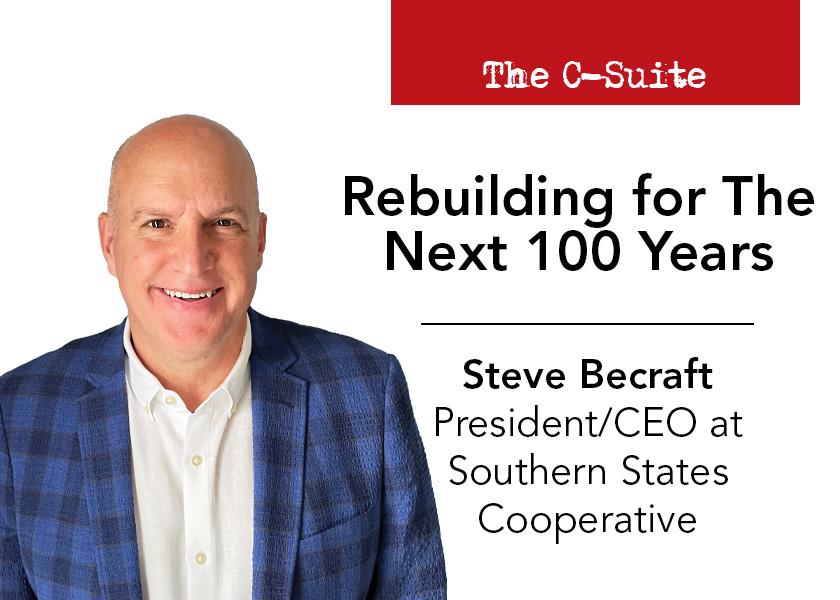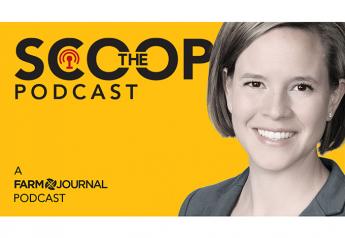Southern States: Rebuilding for The Next 100 Years

Steve Becraft was appointed CEO of Southern States in July 2021, after five years in senior leadership roles with the cooperative. Founded in 1923 as Virginia Seed Service to supply seed to Virginia farmers, the cooperative quickly expanded into feed, fertilizer, crop protection, and into surrounding states, and became known as Southern States Cooperative in the 1930s. Today, Southern States has locations in Virginia, Maryland, West Virginia, Kentucky, North Carolina, South Carolina along with professional turf businesses in Alabama and Georgia. This year marks the cooperative’s 100th year in business. And as Becraft describes, there’s more to celebrate than the centennial milestone.
What makes this 100-year milestone so special?
Less than one half of 1% of businesses in the United States survive 100 years. As a cooperative, it makes it even more special as the cooperative business model is unique. The celebration also comes during our second year of a turn-around with a renewed focus as an ag-retail cooperative.
What can you share about the trajectory over time for Southern States?
For 77 straight years, this organization grew and was successful. At the turn of the 21st century, we had a strategy to significantly increase our size and scope to compete in both wholesale and retail distribution. Unfortunately, the company took on a tremendous amount of debt and it imperiled our balance sheet. We got into some businesses we weren’t resourced to run well. So over 20 years, we lost our way. As I reflect on the last few years building up to our 100th anniversary, we have been successful at getting back to our roots as an ag retail co-op serving our members. We are a significantly different company, but we now have the opportunity for sustained profitability.
Why did you join as the company’s leader?
I came to Southern States to lead its agronomy team in 2016. For me, it’s the honor of a lifetime to be part of the team that has changed our business model and positioned us for the future. As a result of our changes, I believe we’ll be here for another 100 years. We have great employees; a solid business model and our culture is improving every day. People want to be on a winning team, and when you go multiple years without making money, it’s hard to do some of the things successful companies can do. The challenges of the past few decades compared to our recent success has given our team a true sense of accomplishment.
How do you describe the challenges in ag retail today?
You have to do it all well and employees really do make all the difference. Those retailers who can get the people part of their model right have a significant advantage regardless of other variables. Ag Retail in the cooperative model is a special industry serving our farmer owners and being willing and able to adapt to change is a skill required to prosper.
Since 2020, you have partnered with Growmark as an agronomy and energy supplier. How has that changed your business?
Iron sharpens iron. They are more than a wholesaler or supplier, they are a partner in the cooperative system. We are the beneficiary of being part of the Growmark supply chain. They have great people and a strong business model. It feels like a partnership rather than merely a transactional relationship.
In the wholesale business, it’s about scale, liquidity/working capital, and risk management. We didn’t have the working capital to be in both places—retail and wholesale. Now, our local Southern States member cooperatives are wholesale customers of Growmark, and our company-owned retail locations combined are one of their largest customers for energy and agronomy. Our partnership has been good for Growmark, Southern States and our Cooperative Members.
With this focus on retail, what would you share?
Our retail-only model has legs and has sustainability. It’s been a turn-around project for Southern States. We had our first profitable year last year in some time, and we’re ahead of budget year to date this year.
Every organization wants to be successful and wants to win. Previously, I would compare us to a 10,000 acre farmer with a 500 acre balance sheet. We were using the majority of our working capital for our wholesale business at time at the expense of optimizing our retail opportunities. We sold off the wholesale business, and we kept the last mile business—it’s what we do best – it’s where we have the strongest relationships and create the most value and it’s what our members asked us to protect.
What has the change in focus meant for your team?
We are now investing in people, rolling stock and facilities. It’s been rewarding to see the response of our teams. While we are only two and half years into the new business model, it’s validated. So now our focus is to align the strategy and plot it on a growth path—holding our own isn’t going to work long term.
Your business has changed, and farmers’ businesses are changing. What are you watching?
Retailers and farmers are both challenged with labor. It’s a trend that has not peaked yet. We’ve enjoyed a few strong years on the farm and at retail but we likely all have some tough years ahead of us. Culture matters, whether it’s a farm or retail store. If you don’t have a culture where people are valued, and cared about, turnover will increase; therefore, we are doubling down on our people strategy.
Technology trends also must get our attention – whether it’s drones, automation, precision ag or variable rate – we need to be sure we effectively leverage technology to the benefit of our farmer owners.
You mention making your retail stores reflect their local customers. Tell us more.
Our core business is in six states, and we have pockets that are purely energy, pockets that are purely agronomy. And areas that are a little of everything. The East Coast continues to experience significant population growth and urban sprawl. We work to stay relevant as our customer base shifts. We’ve gotten more focused on our identity in each specific market and removing any emphasis on things that don’t make money. In other words, we’re tidying up our portfolio while putting an anchor in the market. Once you leave a marketplace, you don’t get a chance to come back. It’s important we give every asset and every team the opportunity to be successful.
You have more than 100 Southern States Cooperative branded retail locations. How do you think about the wider business and those individual stores?
Retail is simple: hire good people who enjoy what they do. You must win the relationship on the farm. It can take two to five years to get there, and it can take a lifetime to win it back if you violate their trust. We look at the customer experience end to end— from ordering product, delivery, application and billing. I think retail is a local battle because it’s all about relationships.
I have a passion around the people side of the business. We have raised the bar on manager expectations to have the right kind of folks leading. You aren’t going to attract and retain talent without leaders. And I feel good about the succession of the organization because of the talent we have in our cooperative.
What do you want people to know about Southern States now celebrating its 100th anniversary?
We are financially stable. Today, we are improving our performance, and we are growing. We plan to serve and compete for business for decades to come. Competitors didn’t make life easy for us during our difficult years and our people are the reason we’re still here.
I want our employees to know, while it’s aspirational, we desire to become the employer of choice. This is a wonderful industry. We are creating a culture that will attract talent. I want people to know we are grateful that strong organizations have come along side us and helped us make this transition. We didn’t make this all on our own.
Momentum is a powerful thing. We’ve turned the flywheel in a new direction. For three years, it seemed like we’d solve one problem and another would show up. And now it seems like we win in one spot and another opportunity shows up. Things have started to go our way. Momentum is precious. We will nurture the momentum. It has given us an opportunity to grow and rebuild the company. We have simplified the business model and removed excuses. Now, we will hold ourselves accountable to execute with the farmer customer.
From the competence I see in our team, the feedback from field visits, I can taste it in the water. Southern States will be a force to reckon with again. I look forward to that. Our members deserve a strong Southern States that is competing for their business every day.







